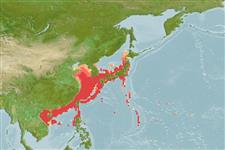分类 / Names
俗名 | 同种异名 | Catalog of Fishes(属, 种) | ITIS | CoL | WoRMS | Cloffa
Teleostei >
Anguilliformes (Eels and morays)
鰻目 (Eels and morays) >
Anguillidae (Freshwater eels)
鰻鱺科(Freshwater eels) (Freshwater eels)
Etymology: Anguilla: Latin, anguilla, .-ae = eel (Ref. 45335).
More on authors: Temminck & Schlegel.
Environment: milieu / climate zone / depth range / distribution range
生态学
海洋; 淡水; 半咸淡水 居于水底的; 降海洄游 (Ref. 51243); 深度上下限 1 - 400 m (Ref. 6898). 亚热带的; 4°C - 27°C (Ref. 12468); 46°N - 15°N, 105°E - 170°E
Asia: Japan to the East China Sea, Taiwan, Korea, China and northern Philippines. Spawning grounds of this species are presumed to be in the western Mariana Islands, at a salinity front near 15°N and 140°E (Ref. 54488). Most expensive food fish in Japan. Introduced elsewhere.
亚洲: 日本到东中国海,台湾,韩国,中国与菲律宾北部。 在 15 ° N 与 140 ° E 附近的盐度前面, 这种的产卵场被推测在西方的马里亚纳群岛中。 (参考文献 54488) 在日本的大多数的贵食用鱼。 引入了其他地方。
大小 / 重量 / 年龄
Maturity: Lm ? range ? - ? cm
Max length : 150 cm TL 雄鱼/尚未辨别雌雄; (Ref. 9828); common length : 40.0 cm SL 雄鱼/尚未辨别雌雄; (Ref. 35840); 最大体重: 1.9 kg (Ref. 82795)
脊椎骨: 114 - 118. Plain-colored.
无花纹色彩的。
Spawning occurs in the sea; small eels ascend the rivers in schools; develop and grow in freshwater. The species may crawl over land at night from one place to another (Ref. 5258, 11230). Adults feed on crustaceans, insects and fish (Ref. 5258). Maximum weight given (1889 g) has a maximum length of 100.8 cm TL in Ref. 82795. Utilized fresh, smoked, canned and frozen; eaten steamed, broiled and baked (Ref. 9988). Used in Chinese medicine (Ref. 12166).
在海洋产卵; 小的鳗鱼上溯到河成群; 发育而且生长在淡水中。 此鱼种可能从一个地方到另外的爬行土地之上在晚上。 (参考文献 5258,11230) 吃甲壳动物,昆虫与鱼。 (参考文献 5258) 生鲜使用,烟熏了, 罐装及冷冻; 清蒸, 火烤而且烧烤。 (参考文献 9988) 被用于中药材了。 (参考文献 12166)
Life cycle and mating behavior
成熟度 | 繁殖 | 产卵场 | 卵 | 孕卵数 | 仔鱼
Assuming reproductive mode to be the same as that of Anguilla anguilla.亚洲: 日本到东中国海,台湾,韩国,中国与菲律宾北部。 在 15 ° N 与 140 ° E 附近的盐度前面, 这种的产卵场被推测在西方的马里亚纳群岛中。 (参考文献 54488) 在日本的大多数的贵食用鱼。 引入了其他地方。
Masuda, H., K. Amaoka, C. Araga, T. Uyeno and T. Yoshino, 1984. The fishes of the Japanese Archipelago. Vol. 1. Tokai University Press, Tokyo, Japan. 437 p. (text). (Ref. 559)
世界自然保护联盟红皮书 (Ref. 130435)
濒危 (EN) (A2bcd); Date assessed: 06 November 2018
人类利用
渔业: 高经济性; 养殖: 商业性
工具
特别资料
下载 XML
网络资源
Estimates based on models
Preferred temperature (Ref.
123201): 2.5 - 23.3, mean 17 °C (based on 432 cells).
Phylogenetic diversity index (Ref.
82804): PD
50 = 0.5000 [Uniqueness, from 0.5 = low to 2.0 = high].
Bayesian length-weight: a=0.00062 (0.00039 - 0.00099), b=3.18 (3.05 - 3.31), in cm total length, based on LWR estimates for this species & Genus-body shape (Ref.
93245).
营养阶层 (Ref.
69278): 3.6 ±0.51 se; based on food items.
Generation time: 15.7 ( na - na) years. Estimated as median ln(3)/K based on 1
growth studies.
回复力 (Ref.
120179): 低的, 最小族群倍增时间4.5 - 14 年 (K=0.07).
Fishing Vulnerability (Ref.
59153): High to very high vulnerability (71 of 100).
Nutrients (Ref.
124155): Calcium = 32.7 [19.9, 65.7] mg/100g; Iron = 0.741 [0.434, 1.157] mg/100g; Protein = 19.5 [17.7, 21.4] %; Omega3 = 0.35 [0.19, 0.67] g/100g; Selenium = 55.1 [28.6, 103.5] μg/100g; VitaminA = 8.74 [1.85, 42.36] μg/100g; Zinc = 0.685 [0.498, 0.991] mg/100g (wet weight); based on
nutrient studies.
